Conceptual art, also referred to as conceptualism, is art in which the concept(s) or idea(s) involved in the work are prioritized equally to or more than traditional aesthetic, technical, and material concerns. Some works of conceptual art may be constructed by anyone simply by following a set of written instructions. This method was fundamental to American artist Sol LeWitt's definition of conceptual art, one of the first to appear in print:
In conceptual art the idea or concept is the most important aspect of the work. When an artist uses a conceptual form of art, it means that all of the planning and decisions are made beforehand and the execution is a perfunctory affair. The idea becomes a machine that makes the art.

Odd Nerdrum is a Norwegian figurative painter, born in Sweden. His work is held by museums worldwide. Themes and style in Nerdrum's work reference anecdote and narrative. Primary influences by the painters Rembrandt and Caravaggio help place his work in direct conflict with the abstraction and conceptual art considered acceptable in much of Norway. Nerdrum creates six to eight paintings a year. They include still life paintings of small, everyday objects, portraits and self-portraits, and large paintings allegorical and apocalyptic in nature. The figures in Nerdrum's paintings are often dressed as if from another time and place.
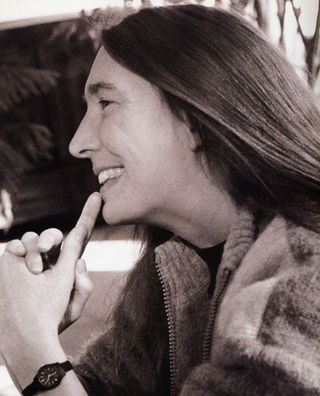
Jenny Holzer is an American neo-conceptual artist, based in Hoosick, New York. The main focus of her work is the delivery of words and ideas in public spaces and includes large-scale installations, advertising billboards, projections on buildings and other structures, and illuminated electronic displays.

Alice Neel was an American visual artist, who was known for her portraits depicting friends, family, lovers, poets, artists, and strangers. Her career spanned from the 1920s to 1980s. Her paintings have an expressionistic use of line and color, psychological acumen, and emotional intensity. She pursued a career as a figurative painter during a period when abstraction was favored, and she did not begin to gain critical praise for her work until the 1960s.

Lawrence Charles Weiner was an American conceptual artist. He was one of the central figures in the formation of conceptual art in the 1960s. His work often took the form of typographic texts, a form of word art.
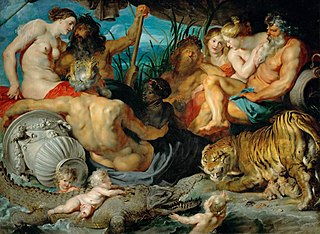
A work of art, artwork, art piece, piece of art or art object is an artistic creation of aesthetic value. Except for "work of art", which may be used of any work regarded as art in its widest sense, including works from literature and music, these terms apply principally to tangible, physical forms of visual art:
Sherrie Levine is an American photographer, painter, and conceptual artist. Some of her work consists of exact photographic reproductions of the work of other photographers such as Walker Evans, Eliot Porter and Edward Weston.

Louise Lawler is a U.S. artist and photographer living in Brooklyn, New York. From the late 1970s onwards, Lawler’s work has focused on photographing portraits of other artists’ work, giving special attention to the spaces in which they are placed and methods used to make them. Examples of Lawler's photographs include images of paintings hanging on the walls of a museum, paintings on the walls of an art collector's opulent home, artwork in the process of being installed in a gallery, and sculptures in a gallery being viewed by spectators.
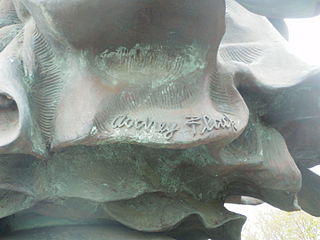
Audrey Flack is an American artist. Her work pioneered the art genre of photorealism and encompasses painting, printmaking, sculpture, and photography.

Alma Woodsey Thomas was an African-American artist and teacher who lived and worked in Washington, D.C., and is now recognized as a major American painter of the 20th century. Thomas is best known for the "exuberant", colorful, abstract paintings that she created after her retirement from a 35-year career teaching art at Washington's Shaw Junior High School.

Hannah Wilke was an American painter, sculptor, photographer, video artist and performance artist. Wilke's work is known for exploring issues of feminism, sexuality and femininity.
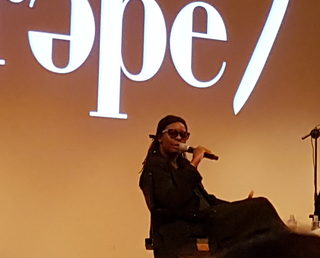
Mickalene Thomas is a contemporary African-American visual artist best known as a painter of complex works using rhinestones, acrylic, and enamel. Thomas's collage work is inspired from popular art histories and movements, including Impressionism, Cubism, Dada, the Harlem Renaissance, and selected works by the Afro-British painter Chris Ofili. Her work draws from Western art history, pop art, and visual culture to examine ideas around femininity, beauty, race, sexuality, and gender.
Twentieth-century art—and what it became as modern art—began with modernism in the late nineteenth century.

Jennifer Bartlett was an American artist and novelist. She was best known for paintings and prints that combine the system-based aesthetic of conceptual art with the painterly approach of Neo-Expressionism. Many of her pieces were executed on small, square, enamel-coated steel plates that are combined in grid formations to create very large works.

Barkley L. Hendricks was a contemporary American painter who made pioneering contributions to Black portraiture and conceptualism. While he worked in a variety of media and genres throughout his career, Hendricks' best known work took the form of life-sized painted oil portraits of Black Americans.
Deborah Kass is an American artist whose work explores the intersection of pop culture, art history, and the construction of self. Deborah Kass works in mixed media, and is most recognized for her paintings, prints, photography, sculptures and neon lighting installations. Kass's early work mimics and reworks signature styles of iconic male artists of the 20th century including Frank Stella, Andy Warhol, Jackson Pollock, and Ed Ruscha. Kass's technique of appropriation is a critical commentary on the intersection of social power relations, identity politics, and the historically dominant position of male artists in the art world.
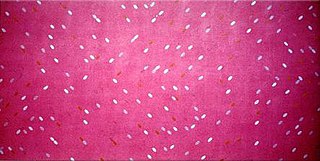
Lawrence M. "Larry" Poons is an American abstract painter. Poons was born in Tokyo, Japan, and studied from 1955 to 1957 at the New England Conservatory of Music, with the intent of becoming a professional musician. After seeing Barnett Newman's exhibition at French and Company in 1959, he gave up musical composition and enrolled at the School of the Museum of Fine Arts, Boston. He also studied at the Art Students League of New York. Poons taught at The Art Students League from 1966 to 1970 and currently teaches at the League.
Molly Springfield is an American artist whose work includes labor-intensive drawings of printed texts and visual explorations of the history of information and mediated representation.
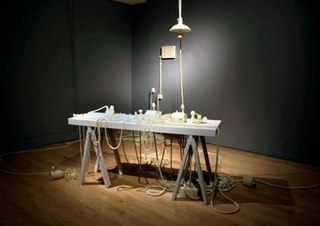
Jeanne Silverthorne is an American sculptor, known for cast-rubber sculptures and installations that explore the artist's studio as a metaphor for artistic practice, the human body and psyche, and mortality. She gained prominence in New York City in the 1990s, as one of several material-focused sculptors who critiqued the austere, male-dominated Minimalist movement by embracing humble, unorthodox media and hand-made, personal and ephemeral qualities championed by artists such as Eva Hesse and Louise Bourgeois. She treats the studio as a physical and conceptual site to be excavated, documented and inventoried, examining in the words of Sculpture's Jan Riley "the end of studio arts … and the impossibility of this mode of expression regaining its former creative validity and vitality in today’s world." Art in America critic Raphael Rubinstein wrote that, like the late studio paintings of Philip Guston, Silverthorne examines "deeply melancholic realms, enlivened by the occasional mordant joke, in which lowly objects are relentlessly and lovingly queried for a meaning they never seem quite ready to yield."

Ellen Harvey is an American-British conceptual artist known for her painting-based practice and site-specific works in installation, video, engraved mirrors, mosaic and glass. She frequently pairs traditional representational vocabularies and genres with seemingly antithetical postmodern strategies, such as institutional critique, appropriation, mapping and pastiche. Her work examines such themes as art as a mirror, interactions between built environment and landscape, ruins and the Picturesque aesthetic, and cultural and economic relationships between museums, artists and publics. Curator Henriette Huldisch writes of her work, "haunted as it is by the notion of art's ultimate futility, her paradoxical stake is in persistently testing art's possibility to do something in the world after all."














